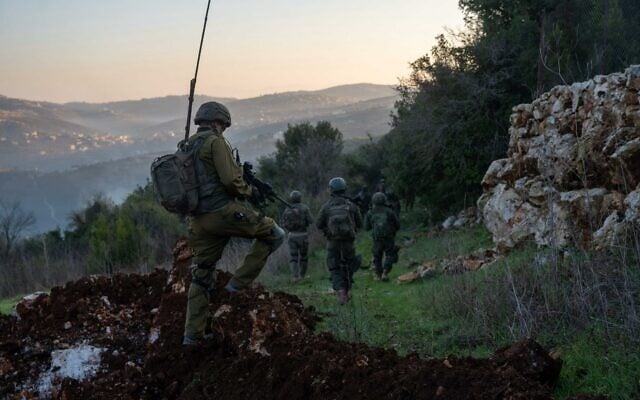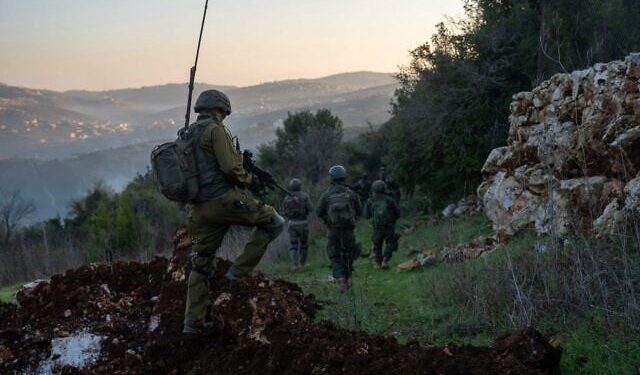The Israeli army announced Monday that it had struck several Hezbollah sites in Lebanon overnight, saying the targets violated the terms of the ceasefire agreement. He said he did so after the international ceasefire monitoring mechanism failed to resolve these issues, despite being briefed about them.
The targets included a rocket launcher, an unspecified military site and “roads along the Syrian-Lebanese border used to smuggle weapons to Hezbollah,” the army said in a statement.
A fragile ceasefire between Israel and the Iran-backed terror group took effect on November 27, after more than a year of cross-border Hezbollah attacks and two months after Israel launched a devastating campaign against the terrorist group.
Lebanon’s national news agency said Israeli jets targeted the outskirts of Janta in the eastern Baalbek region as well as areas near Nabatieh in the south. It was not specified whether there were any casualties.
The Israeli military said that before the strikes it had reported Hezbollah’s violations to an international mechanism set up as part of the ongoing ceasefire, but that “threats were not taken into account.” taken into account”.
“The Israeli military continues to act to eliminate any threat to the State of Israel and will act to prevent any attempt by Hezbollah to rebuild its forces in accordance with the ceasefire agreements,” the Israeli military added.
אחת התקיפות, הפעם באזור דיר א-זהארני It’s true. pic.twitter.com/ZLEtb8s5Rr
– ישראל היום (@IsraelHayomHeb) January 12, 2025
Lebanese media reported Israeli airstrikes in the village of Houmine al-Faouqa, in the Nabatieh district.
The village is located north of the Litani River, approximately 17 kilometers from the Israeli border.
אווירי של צה”ל בדרום המדינה@Doron_Kadosh pic.twitter.com/nA2HIwiLd1
– גלצ (@GLZRadio) January 12, 2025
Other media reported that airstrikes took place in the Janta region of the Bekaa Valley, near the border with Syria.
Under the terms of the deal, which has a Jan. 26 deadline, the Iran-backed terror group must withdraw north of the Litani River – about 30 kilometers (18 miles) from the border with Israel – while Israel must withdraw from southern Lebanon by January 26, to be replaced by the Lebanese Armed Forces and the international peacekeeping force UNIFIL.
Washington reportedly assured Beirut that Israel would complete its withdrawal on time, and the Israeli army said on Saturday that it had completed its deployment in the western sector of southern Lebanon following Israel’s withdrawal from that area.
فيديو لغارة عنيفة جداً استهدفت حومين الفوقا pic.twitter.com/sOqPQmgxFn
– هنا لبنان (@thisislebnews) January 12, 2025
On Sunday, the Kan public broadcaster reported that Israeli troops sweeping areas under IDF control repeatedly discovered weapons hidden by Hezbollah, including mortars and anti-tank missiles.
Israeli officials have reportedly indicated that the IDF could remain in southern Lebanon beyond the withdrawal deadline, if the Lebanese army does not replace the Israeli presence there quickly enough. The Israeli army also accused the Lebanese armed forces of failing to comply with a request for action against Hezbollah missile launchers located in southern Lebanon, in violation of the agreement, prompting them to strike these launchers.
Lebanese Prime Minister Najib Mikati insisted Friday that the state would begin disarming southern Lebanon, and on Thursday new Lebanese President Joseph Aoun promised in his inauguration speech that the state would hold a monopoly on power – a thinly veiled threat against Hezbollah, which has long acted with impunity.

Troops of the 300th Brigade operate in southern Lebanon, in a photo released January 8, 2025. (Israel Defense Forces)
Hezbollah began attacking Israel on a near-daily basis on October 8, 2023, a day after the Iranian-backed terrorist group Hamas stormed southern Israel to kill some 1,200 people and take 251 hostages, triggering the war in Gaza.
Israel signed the ceasefire with Hezbollah two months after intensifying its operations against the terrorist group, nearly decimating its leaders, in a bid to stem its persistent rocket fire, which had forced the displacement of some 60,000 inhabitants of the North.
Most have not yet returned home.



